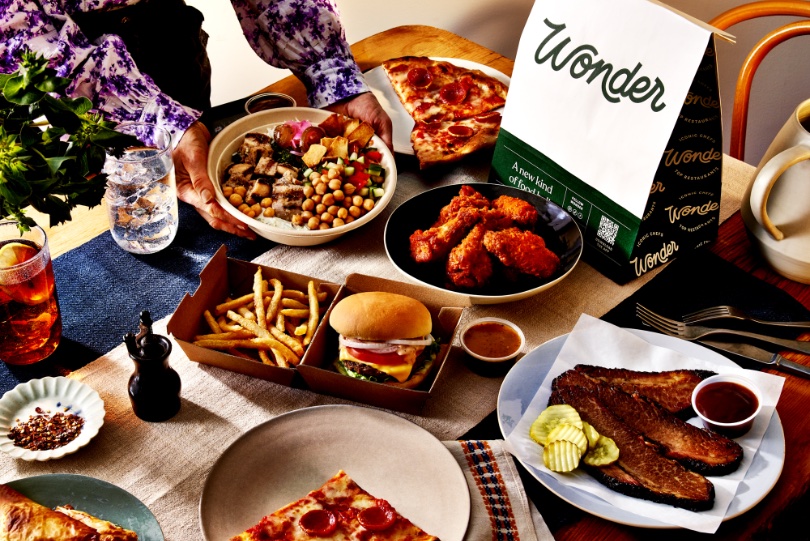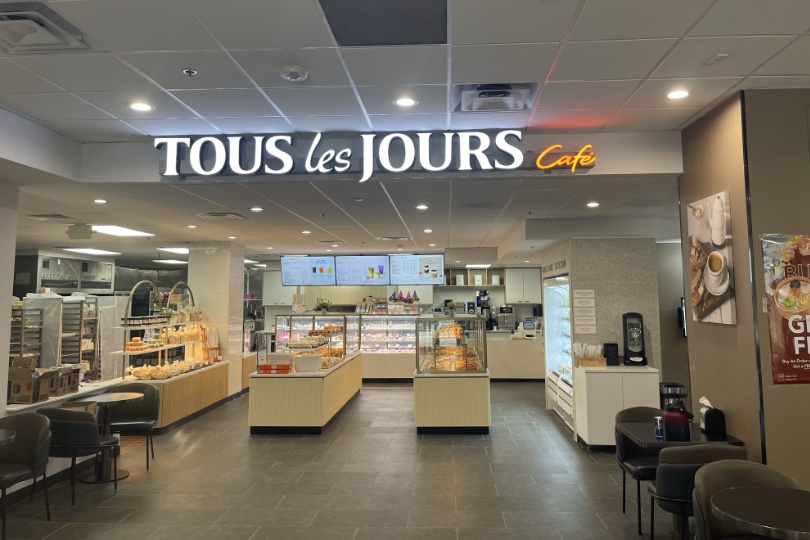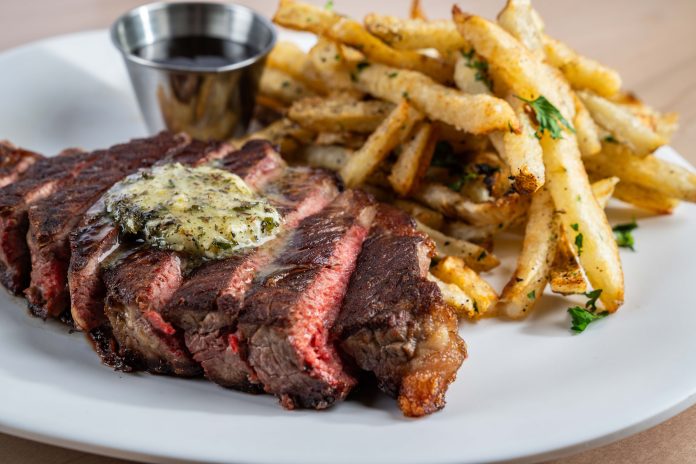Food halls are having a moment. Though not a new concept—Ballston’s bustling Quarter Market opened in 2019, and the kiosk-filled Water Park in National Landing has been a popular foodie destination ever since it debuted two years ago—the trend shows no signs of slowing down.
In 2023, there were about 360 food halls nationwide, up from 35 a decade earlier, according to the Wall Street Journal. “Across the country, restaurateurs and developers have food hall fever, opening giant culinary meccas at an unprecedented rate,” writes another food industry analyst.
The Covid-19 pandemic was a catalyst. “People obviously had to order at home, and so everyone in the restaurant industry was looking for a way to make delivery work,” observes Lisa Jennings, executive editor of Restaurant Business magazine. Customers enjoyed ordering from multiple places through a single food delivery app. When they returned to dining out, they wanted that same convenience.
A Tasty Business Model
The food hall setup is beneficial for businesses, too. For restaurateurs, renting a kiosk or counter space involves less financial risk than opening a full-fledged brick-and-mortar restaurant. Food hall developers, meanwhile, benefit from licensing or franchising deals with known brands (including star chefs), using those names to draw in customers.
“I think the benefit [of food halls] is that we’re able to put six new businesses [in one place] and let people try a variety of different types of food and drink in the footprint of what was just one restaurant before,” says Matt Hall, marketing director for Luna Hall Group, whose food halls focus mostly on pan-Asian dining concepts.
And if one of the choices isn’t appealing to customers? The food hall operator can easily part ways with that vendor and bring in another one. “Part of the appeal of a food hall is that it can have rotating concepts,” Jennings says.
While food halls come in many forms, most have a unified point-of-sale system allowing customers to order from different vendors on the same platform, and often there’s a central bar. “What makes a traditional food hall different from a food court is that it has a bar,” Jennings says, “and that’s where food halls make money.”
In Northern Virginia alone, four food halls have opened in the past 18 months. Here’s a peek at what’s cooking.

Wonder
This food hall boasting concepts by celebrity chefs is rapidly expanding in the Mid-Atlantic and Northeast. A Rosslyn outpost debuted in July, with three more coming to NoVA later this year or early next, including one on the former Brown’s Hardware site in Falls Church City. At Wonder, customers can mix and match dishes from any of the restaurants in a single order for dine-in, takeout or delivery. In Rosslyn, the options include Thai from SriPraPhai, Mediterranean fare from Yasas by Michael Symon and Middle Eastern specialties from D.C.’s award-winning Maydan.
Wonder opened its first location in Manhattan in 2018, and has since secured more than $2 billion in investments. In 2024, it acquired the GrubHub delivery platform for $650 million. The company collaborates with established chefs and restaurant brands to create food hall menus that work well for delivery, paying partners a fee, plus equity, in exchange for the right to use their brands and recipes without paying royalties.
“Wonder takes the best parts of the food hall model—variety, quality and efficiency—and levels it up,” says Jason Rusk, executive vice president of restaurant operations at Wonder. “We think of Wonder as the next evolution of the food hall. Customers can order from multiple restaurants in one transaction, whether they’re dining in, picking up or getting it delivered. We’ve also been able to partner with some of the best chefs and beloved restaurants from across the country to bring a wide range of top-tier cuisine to local neighborhoods.”

Upside on Moore
Upside on Moore debuted at Rosslyn City Center in March 2024, replacing another food hall called Assembly that had been there for about three years. The brainchild of Arlington restaurateur Nick Freshman, it houses eight DMV-area vendors, including POTUS-approved Ghostburger, internationally acclaimed Stellina Pizzeria and local fan favorites like Tiger Dumplings. Upside also carves out space for short-term “residencies,” welcoming a mix of food concepts that rotate periodically. (The next one is a sushi spot, Freshman says, although he declined to name names.) There’s a bar, too.
“Food is like fashion; it changes all the time,” says Freshman, whose hospitality consultancy, Mothersauce Partners, has helped bring several popular DMV dining spots to fruition, including Thompson Italian in Falls Church. (Freshman is also a co-owner of Spider Kelly’s in Clarendon.) “If you’re a traditional restaurant, you can’t pivot like that. You just can’t change every season or every year because now everybody wants burritos and before everybody wanted noodles…but we can. I think that is one of the biggest advantages a food hall has.”
Upside’s emphasis on service is a differentiator, he adds. “We do offer a more hands-on hospitality model. You don’t walk in here and you’re on your own like you are at some other food halls. We’re taking care of you. We’re bringing your food on a plate, and we’re going to explain the menu.”
Upside on Moore also boasts a burgeoning events business, with nine spaces for private events. “We’ve seen a tremendous amount of advance bookings for everything from company holiday parties to bar mitzvahs,” Freshman says. The food hall’s robust public events calendar is also chockfull of special offerings like yoga classes, art workshops and comedy shows.

Luna Hall
In late August, Luna Hall opened in Tysons in the space formerly occupied by Sapphire, an Indian and Pakistani restaurant. This NoVA newcomer is part of a local chainlet of Asian-centric food halls that restauranteur Zong Chen has been growing and expanding since 2023 when he opened his first in D.C.’s Chinatown. Another location will open in Rockville later this year or early next.
Chen says he has no plan for rotating vendors—or renting space to vendors at all. Instead, Luna Hall is packed with dining concepts he’s developed himself, such as Dumpling District (known for its rainbow soup dumplings) and Takumi Japanese Bistro and Bar, plus a franchise location of the popular French-Korean bakery Tous les Jours. Pelicana Korean Fried Chicken will join the mix by year’s end, says Hall, the marketing manager. A bar and two other small concepts are still in the works.
“Luna Hall is a food hall that we created because a lot of our friends wouldn’t know what they wanted when we would go out to eat,” Hall says. “Some would want Japanese, some people would want Chinese, some people would want other things.” Luna caters to that mindset by offering a variety of vetted options in one place.
Luna Hall Group has a history of opening multiple restaurants in the same neighborhood. In Ballston Quarter and the Fashion Centre at Pentagon City, for example, the company operates outposts of Dumpling District, Kung Fu Tea and Tous les Jours.
“When we have an area that we really like, we try to put a few different stores there,” Hall says. “It’s good for us because we can manage the team and we can share resources.” Food halls are a logical next step, with the advantage of being able to secure a liquor license and host private parties. “The reception has been great,” he says of the Tysons location. “We’re really excited.”
View this post on Instagram
Pop-Up District
In June, Falls Church’s Eden Center welcomed Pop-Up District, a hub for all manner of Asian-style eats. Founders Jay Tran and Alice Nguyen have put their own twist on the model with a nearly round-the-clock concept that’s open 8 a.m. to 2 a.m., serving coffee, pastries and fast-casual lunch options before taking on a nightclub vibe around 9 p.m. “We’re packed every weekend now,” Tran says.
The day-to-evening model keeps lulls to a minimum, he says. Customers can arrive early to get their caffeine fix and use the free Wi-Fi to do work, then grab lunch and dinner from any of five vendors, including Honey Pig Cupbop, an offshoot of Annandale’s fan favorite Korean barbecue, Honey Pig. Another option, Eatsy, is a kiosk version of the Thai restaurant in Falls Church by the same name.
“At a restaurant, you finish your food and you have to leave,” says Tran, who also owns TeaDM, a bubble tea shop that started at the Eden Center in 2016 and now has four locations. “That’s not the way we work.”
Although food is central to the space, it’s not the only draw. The pop-up part of the name refers to the food hall’s rotating roster of pop-up vendors selling a range of goods, and not just consumables. A July pop-up sale featured viral sensation Labubu, a collection of plush toy monsters from China. Pop-Up District also sells tickets to nightlife events, such as a two-night Labor Day weekend music fest.
